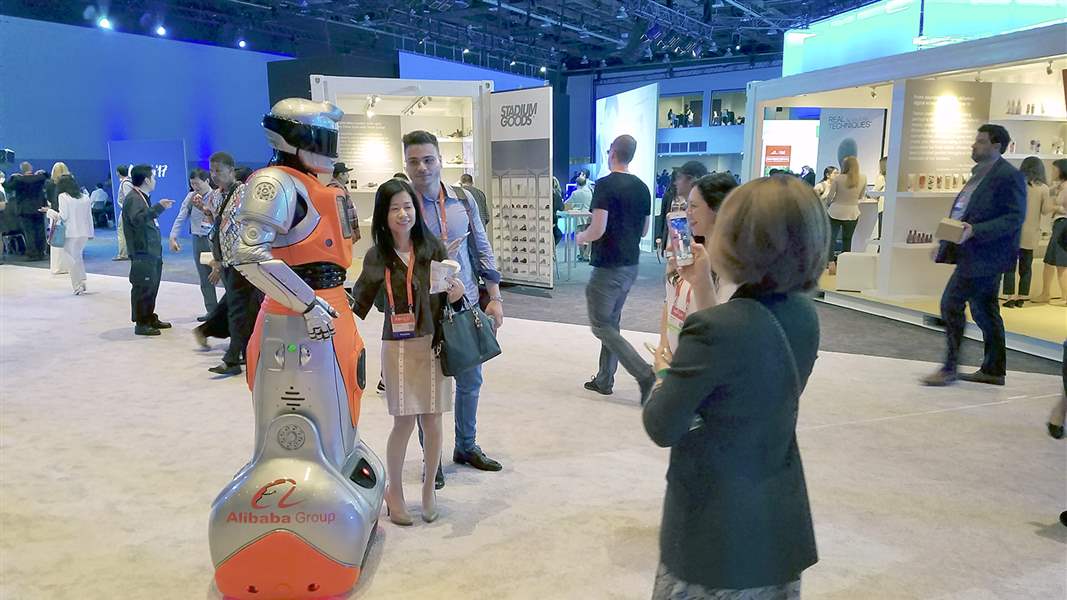
Business owners urged to look at e-commerce, China market
6/22/2017
Visitors view displays outside the hall before the start of Gateway ’17.
THE BLADE/JON CHAVEZ
Buy This Image
DETROIT — Although he’s already a billionaire, Jack Ma believes he can’t really be declared a success until the year 2101.
“We will not be successful until we’ve been around 102 years,” said the chairman and co-founder of Alibaba Group Holdings, an ecommerce company in China that has been compared to Amazon.com. “We’re only at 18,” he added.
Mr. Ma, 52, was the organizer and key figure of Gateway ’17, an international trade event held Tuesday and Wednesday at the Cobo Center in Detroit and attended by 3,000 people from across the country representing small and medium-sized businesses.
The purpose of the event was simple — to get more businesses to conduct ecommerce in China and hopefully through Alibaba, an $158-billion Internet-based firmed that provides consumer-to-consumer, business-to-consumer, and business-to-business transactions through its web portals.
“If you’re not a globalized business, you will be out of business,” Mr. Ma said. “But if you’re using the Internet, you can be global.”
VIDEO: Gateway ’17
The attendees, who represented thousands of small businesses, heard from a heavyweight lineup of business personalities to augment Mr. Ma’s message stressing ecommerce in China.
The speaker lineup Wednesday included lifestyle guru Martha Stewart, UPS Chief Executive David Abney, and Gerber CEO Bill Partyka.
Also, a trade show floor was filled with booths manned by companies already doing online business in China, and several smaller sessions focusing on a variety of topics, including distributor relationships, food sales to China, and selling apparel online in China.
“Having a global event like this right here in Detroit really, to me, tells the world, tells U.S. businesses, that competing on a global scale, that exporting, that thinking internationally is not something just for the big companies. And I think that that is so important,” said Colleen Kardasz, export assistance director at the Toledo Regional Chamber of Commerce.
Ms. Kardasz was at the event trying to gathering information on behalf of several northwest Ohio companies interested in doing business in China.
The reasons for doing business in China were heard throughout event speeches and even on panels of the various display booths — China’s middle class is growing at an astounding rate. It already tops 300 million, or roughly the population of the entire United States. And that middle class are bunch of voracious online shoppers, with nearly 200 million of them doing their e-commerce via mobile phones.
The last 30 years brought a computer revolution. The next 30, Mr. Ma said, will create a tremendous amount of jobs, feature the growth of artificial intelligence, and find everyone doing ecommerce.
In his midmorning presentation, Mr. Ma used video images to show the staggering growth of Shanghai the last 30 years, going from vacant farm fields to a thriving metropolis with multiple skyscrapers.
“When Marco Polo went to China, it took eight years,” Mr. Ma said. “Today, it takes eight seconds on the Internet,”
The United States, Mr. Ma said, has 10 cities with a population of more than 1 million. China has 142 such cities. And consumers in those cities want to buy American goods and, more than not, they want specialty items from small businesses.
That means great sales opportunities for small U.S.-based businesses catering to the world’s second-largest economy at $11 trillion, Mr. Ma said.
Ms. Stewart, who pioneered her Martha Stewart Living brand into a multimedia empire, said China is going through the same thing the United States went through years ago with more population moving from rural areas to cities.
The Chinese now have rising wages that allows them to buy luxury goods, Ms. Stewart said. Alibaba “just makes everything available,” she added.
When Alibaba began in 1999, it founded on a $50,000 loan and the Chinese version of the Internet was “terrible,” Mr. Ma said. The Alibaba chairman himself was branded a “loser” who failed a college entrance exam three times, was rejected from Harvard 10 times, and was the only applicant out of 24 not to be hired by a KFC franchise.
But Alibaba slowly grew into a juggernaut whose lineup includes Tmall — an online shopping website that features over a billion products and is among the 20 most visited websites in the world.
Contact Jon Chavez at: jchavez@theblade.com or 419-724-6128.